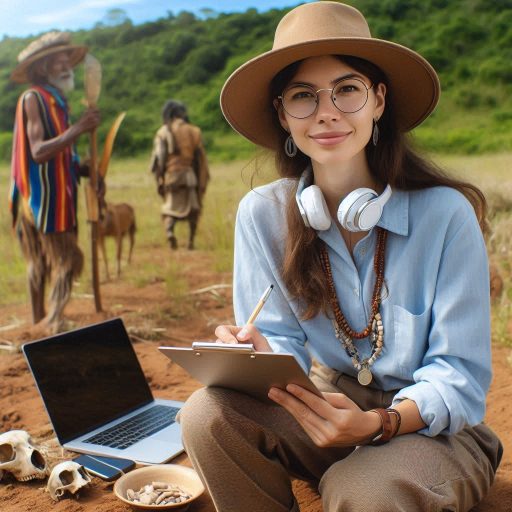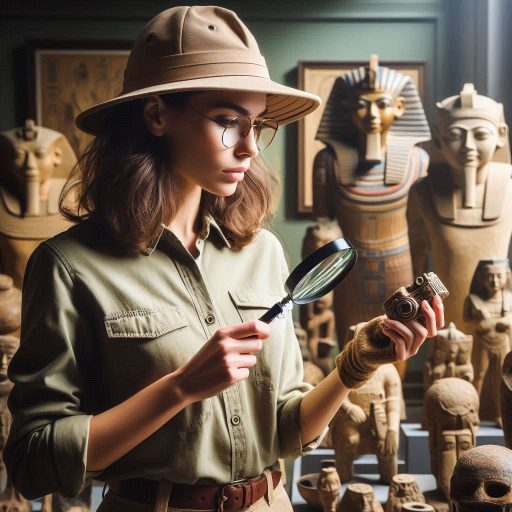Introduction
Anthropology is the study of humans, their societies, and cultures.
It helps us understand the complexities of human behavior and relationships.
By exploring various cultures, anthropology reveals the richness of human experience.
This discipline promotes awareness and appreciation of cultural diversity.
Anthropologists investigate how cultural, biological, and historical factors shape societies.
They analyze human behavior through various lenses, including social norms and traditions.
This holistic approach aids in comprehending how societies function and evolve.
Anthropology consists of four main branches: cultural anthropology, physical anthropology, archaeology, and linguistic anthropology.
Cultural anthropology focuses on cultural practices, beliefs, and social structures.
Physical anthropology examines human biological diversity and evolution.
Archaeology studies past human cultures through material remains.
Linguistic anthropology explores the relationship between language and culture.
Together, these branches provide a comprehensive understanding of humanity.
Anthropology plays a vital role in addressing contemporary social issues.
It fosters empathy and respect among diverse communities.
By studying anthropology, we gain insights into our shared human experience and the factors that shape it.
Exploring Cultural Anthropology
Study of Different Cultures and Societies
Cultural anthropology focuses on the study of different cultures and societies.
It examines how people live, think, and interact within their cultural contexts.
Cultural anthropologists strive to understand the beliefs, practices, and values that shape various communities.
They analyze how culture influences behavior, social structures, and human experiences.
Cultural anthropologists conduct in-depth research to gather insights about diverse societies.
They explore various aspects, including rituals, traditions, and social norms.
By examining these elements, they uncover the complexities of human behavior and cultural diversity.
This field plays a crucial role in promoting cross-cultural understanding and appreciation.
Methods Used in Cultural Anthropology
To study cultures effectively, cultural anthropologists employ various methods.
One primary method is participant observation.
In this approach, researchers immerse themselves in the community they study.
They engage with locals, participate in daily activities, and observe interactions.
This immersive experience allows anthropologists to gain firsthand insights into the community’s way of life.
Participant observation helps researchers build trust with community members.
This trust fosters open communication and honest interactions.
As a result, anthropologists can collect richer data and gain deeper insights into cultural practices.
They learn about rituals, celebrations, and everyday life in authentic settings.
Another essential method in cultural anthropology is ethnographic research.
Ethnography involves long-term engagement with a community to document cultural practices and social dynamics.
Researchers often live within the community for extended periods.
This commitment allows them to witness changes and continuity over time.
Ethnographic research includes detailed documentation of interviews, observations, and interactions.
Researchers take meticulous notes, record conversations, and capture cultural events.
This data collection forms the foundation for analyzing and interpreting cultural patterns.
Cultural anthropologists also use various qualitative research techniques.
They conduct interviews to gather personal narratives and experiences.
These interviews provide valuable perspectives on individual and collective identities.
Additionally, anthropologists may analyze artifacts, literature, and historical documents to contextualize their findings.
The findings from cultural anthropology research contribute to a broader understanding of humanity.
They challenge stereotypes and promote awareness of cultural diversity.
By highlighting the unique aspects of different societies, anthropologists foster empathy and respect among people.
Cultural anthropology offers valuable insights into the human experience.
By studying various cultures and societies, anthropologists uncover the richness of human life.
Their methods, such as participant observation and ethnographic research, enhance our understanding of diverse perspectives.
This field promotes appreciation for the complexities of human behavior, encouraging a more inclusive worldview.
Delving into Physical Anthropology
Study of Human Evolution, Biological Variation, and Primatology
Physical anthropology focuses on the biological aspects of humans.
It examines human evolution, biological variation, and primatology.
Researchers in this field study how humans have changed over time.
They analyze fossils, skeletal remains, and genetic information.
This research helps uncover the story of human origins.
Human evolution is a core area of study.
Anthropologists explore how early hominins adapted to their environments.
They examine the physical traits that distinguish modern humans from our ancestors.
By studying evolutionary patterns, researchers identify the factors driving human development.
Biological variation is another crucial aspect of physical anthropology.
This area investigates the differences among human populations.
Researchers analyze traits such as skin color, body shape, and genetic markers.
They explore how these traits relate to environmental adaptations.
This research highlights the importance of diversity within the human species.
Primatology is also a significant focus.
Physical anthropologists study non-human primates to understand human behavior and evolution.
By observing primates, researchers gain insights into social structures and communication patterns.
This study reveals evolutionary links between humans and primates.
Role of Physical Anthropology in Understanding Human Origins and Genetic Diversity
Physical anthropology plays a vital role in understanding human origins.
By analyzing fossil records, anthropologists can trace the evolutionary lineage.
They identify key species in human evolution and their characteristics.
This understanding helps reconstruct the journey of humans from early ancestors to modern society.
The study of genetics enhances knowledge of human origins.
Physical anthropologists investigate genetic variations across populations.
They use techniques like DNA sequencing to analyze genetic relationships.
This research uncovers the connections between different human groups.
It also sheds light on the migration patterns of ancient populations.
Physical anthropology contributes to understanding genetic diversity.
Researchers study how genetic variations impact health and disease susceptibility.
By identifying genetic markers, they can trace ancestry and heritage.
This knowledge helps address health disparities in different populations.
Physical anthropologists also examine the impact of environmental factors on human biology.
They study how climate, diet, and lifestyle influence physical traits.
This research highlights the interplay between biology and culture in shaping human variation.
Physical anthropology offers essential insights into human evolution and diversity.
By studying human origins, biological variation, and primatology, researchers uncover the complexities of our species.
This field enhances understanding of genetic diversity and its implications for health.
Physical anthropology fosters a greater appreciation for the biological aspects of humanity, emphasizing our shared origins and interconnectedness.
Read: The Future of Botany: Emerging Fields and Innovations
Uncovering Archaeology
Study of Past Human Cultures Through Material Remains
Archaeology studies past human cultures through their material remains.
This field focuses on artifacts, structures, and ecofacts.
By examining these remnants, archaeologists reconstruct ancient societies and their ways of life.
They analyze tools, pottery, and other objects to gain insights into cultural practices.
Artifacts serve as windows into historical contexts.
Each object tells a story about the people who created and used it.
Archaeologists study the materials, craftsmanship, and purpose of artifacts.
They investigate how these items reflect social, economic, and technological aspects of ancient life.
Archaeology also examines architectural remains.
Structures such as temples, houses, and fortifications reveal how societies organized themselves.
These physical spaces indicate social hierarchies and cultural values.
By analyzing spatial arrangements, archaeologists understand how people interacted with their environment.
Ecofacts, such as animal bones and plant remains, offer additional insights.
They provide information about diet, subsistence strategies, and environmental conditions.
Studying these remains helps archaeologists reconstruct ancient ecosystems and human adaptation.
Excavation Techniques and the Importance of Preserving Archaeological Sites
Excavation techniques are crucial in archaeology.
Archaeologists use systematic methods to uncover and record artifacts.
They employ tools like trowels, brushes, and shovels to carefully dig through layers of soil.
This meticulous process ensures that artifacts remain undamaged and contextually relevant.
Excavation often follows a grid system.
Archaeologists divide sites into squares to maintain accurate records.
This technique helps document the location and association of each find.
By maintaining a detailed record, archaeologists can reconstruct the chronological sequence of occupation.
Preserving archaeological sites is essential for future research.
These sites offer invaluable information about past cultures and histories.
However, many sites face threats from urban development and climate change.
Preservation efforts aim to protect these fragile resources for future generations.
Archaeologists advocate for site conservation and responsible excavation practices.
They collaborate with governments, communities, and organizations to ensure protection.
Public awareness campaigns help highlight the significance of archaeological heritage.
Moreover, archaeologists often engage in salvage archaeology.
This practice occurs when development threatens sites.
Salvage archaeologists conduct emergency excavations to recover artifacts before destruction.
These efforts ensure that valuable information is not lost.
Archaeology uncovers the richness of past human cultures through material remains.
By studying artifacts, structures, and ecofacts, archaeologists reconstruct ancient societies.
Excavation techniques and preservation efforts are vital for protecting this heritage.
The field of archaeology fosters a deeper understanding of human history and cultural evolution.
Through careful study and conservation, we can ensure that these stories endure for generations to come.
Read: What Does a Geologist Do? Career Overview and Insights

Understanding Linguistic Anthropology
Study of Language and Its Cultural Significance
Linguistic anthropology studies language as a vital part of human culture.
This field examines how language shapes our experiences and interactions.
Linguistic anthropologists explore the ways people use language in different contexts.
They analyze spoken, written, and signed forms of communication across cultures.
Language serves as a powerful tool for expressing identity.
It reflects cultural values, beliefs, and social norms.
Through language, individuals convey their experiences, emotions, and knowledge.
Linguistic anthropologists investigate how dialects and accents signify belonging to specific groups.
The cultural significance of language extends beyond communication.
Language influences how people perceive the world.
Different languages categorize experiences in unique ways, shaping thought processes.
For instance, some languages have specific terms for concepts absent in others.
This linguistic diversity highlights how language molds cultural understanding.
Relationship Between Language, Society, and Culture
Linguistic anthropology explores the intricate relationship between language, society, and culture.
Language not only reflects cultural values but also reinforces social structures.
It plays a role in defining power dynamics within communities.
For example, formal language often signifies authority, while informal speech fosters intimacy.
Anthropologists study how language varies across social contexts.
They examine how different groups use language to construct identities.
This includes analyzing language use in gender, class, and ethnicity.
By exploring these variations, linguistic anthropologists reveal the complexities of human interactions.
Furthermore, the study of language ideologies offers insights into cultural beliefs.
Language ideologies refer to the beliefs about language use and its social implications.
These ideologies influence language preservation and revitalization efforts.
For example, communities may prioritize their native languages to assert cultural identity.
Linguistic anthropologists also investigate language change over time.
They study how languages evolve in response to cultural shifts.
Migration, globalization, and technology can impact language use and development.
Understanding these changes helps anthropologists grasp how cultures adapt and transform.
The role of language in socialization is another key focus.
Language acquisition occurs within social contexts, shaping how individuals learn to communicate.
Children learn language not only from parents but also from peers and communities.
This process emphasizes the importance of social interactions in language development.
Linguistic anthropology deepens our understanding of language and its cultural significance.
By exploring the relationship between language, society, and culture, we gain insights into human behavior.
Linguistic anthropologists analyze how language shapes identity and social dynamics.
Their work highlights the critical role language plays in expressing and preserving culture.
Through this study, we recognize the richness and diversity of human communication.
Read: Educational Path: Becoming a Geologist in the USA
Career Opportunities in Anthropology
Various Job Prospects for Anthropology Graduates
Anthropology graduates have diverse career opportunities across multiple sectors.
These roles often leverage their understanding of human behavior and cultures.
One common path is research positions within academic institutions or private organizations.
Researchers study various topics, including cultural practices, human evolution, and societal changes.
Museum curators also play a vital role in anthropology.
They manage collections of artifacts and ensure their preservation.
Curators design exhibits that educate the public about cultural heritage and historical contexts.
Their work helps raise awareness of anthropological findings.
Cultural consultants offer valuable insights to businesses and organizations.
They guide companies in understanding cultural nuances for effective communication.
Consultants help organizations navigate international markets by ensuring culturally appropriate practices.
Anthropologists may also find roles in government agencies.
They contribute to policy development and social programs, applying anthropological insights to address community needs.
Positions in international development focus on improving living conditions in various regions.
Another opportunity lies in education.
Anthropology graduates can teach at various levels, sharing their knowledge with students.
They can inspire the next generation to explore cultural diversity and human behavior.
The Skills and Qualifications Needed for a Career in Anthropology
To succeed in anthropology, specific skills and qualifications are essential.
Strong research skills are crucial for conducting effective studies.
Anthropology graduates should be proficient in qualitative and quantitative research methods.
This expertise enables them to gather and analyze data accurately.
Effective communication skills are also vital.
Anthropologists must convey complex ideas clearly to diverse audiences.
They often write reports, present findings, and collaborate with interdisciplinary teams.
These abilities enhance their effectiveness in various roles.
Cultural sensitivity plays a significant role in an anthropologist’s success.
Understanding and respecting diverse cultures fosters trust and collaboration.
This sensitivity is especially important for fieldwork and consulting roles.
Problem-solving skills help anthropologists address challenges that arise in their work.
They must think critically and creatively to develop innovative solutions.
Adaptability is equally important, as anthropologists often work in changing environments.
Educational qualifications also matter.
Most anthropology positions require at least a bachelor’s degree in anthropology or a related field.
Many employers prefer candidates with a master’s degree or Ph.D., especially for research roles.
Internships and fieldwork experience provide valuable insights and practical skills.
They allow students to apply theoretical knowledge in real-world situations.
This hands-on experience enhances their resumes and career prospects.
Networking within the anthropology community can open doors to job opportunities.
Attending conferences and joining professional organizations helps build connections.
These relationships can lead to job openings and collaborations in the field.
Anthropology graduates have various career paths available to them.
From research positions to cultural consulting, the opportunities are diverse and fulfilling.
Developing essential skills and qualifications enhances their chances of success in the field.
With dedication and passion, anthropology graduates can make a meaningful impact on society.
Read: Botany Career Fairs and Networking Events
Ethical Considerations in Anthropology
Importance of Ethical Guidelines in Anthropological Research
Ethical guidelines play a crucial role in anthropological research.
They ensure that researchers conduct their work responsibly and respectfully.
Following ethical standards protects both the researchers and the communities they study.
Adhering to these guidelines fosters trust and cooperation between researchers and participants.
Ethically sound research promotes the integrity of the field and its findings.
Issues Such as Cultural Sensitivity, Informed Consent, and Confidentiality
Cultural sensitivity is essential in anthropology.
Researchers must respect the beliefs, values, and practices of the communities they study.
Understanding cultural nuances helps anthropologists avoid misrepresentation and harm.
It also encourages collaboration and fosters positive relationships with community members.
Informed consent is another critical ethical consideration.
Researchers must ensure participants understand the purpose and nature of the study.
Participants should willingly agree to participate without any coercion.
Clear communication about potential risks and benefits is essential.
This transparency empowers individuals to make informed decisions about their involvement.
Confidentiality protects participants’ privacy and personal information.
Anthropologists must keep sensitive data secure and anonymous.
Researchers should take steps to avoid revealing participants‘ identities in publications.
Respecting confidentiality encourages participants to share their experiences openly.
This honesty enhances the richness and validity of the research data.
Ethical dilemmas can arise during anthropological research.
For example, researchers may face conflicts between scientific inquiry and community values.
Navigating these dilemmas requires careful consideration and dialogue with community members.
Anthropologists should prioritize the well-being and rights of participants over their research goals.
Ethics also extend to the interpretation and dissemination of research findings.
Researchers should accurately represent the communities they study.
They must avoid sensationalizing or misinterpreting data to fit preconceived narratives.
Responsible reporting fosters a deeper understanding of cultures and societies.
It helps combat stereotypes and promotes respect for diverse ways of life.
Training in ethics is crucial for aspiring anthropologists.
Educational programs should incorporate discussions on ethical guidelines and best practices.
By instilling a strong ethical foundation, educators prepare students for real-world challenges.
Collaboration with local communities enhances ethical research.
Involving community members in the research process builds trust and accountability.
It also ensures that the research addresses relevant community concerns.
Such collaboration creates a more inclusive and ethical research environment.
Find Out More: Soil Scientists’ Contributions to Urban Planning
Conclusion
Anthropology encompasses the study of human societies and cultures.
This field includes cultural, physical, archaeological, and linguistic anthropology.
Each branch offers unique insights into our diverse world.
Cultural anthropologists explore customs and traditions, while physical anthropologists study human evolution.
Archaeologists examine past civilizations through material remains, and linguistic anthropologists analyze the role of language in culture.
Pursuing a career in anthropology opens numerous opportunities.
Graduates can work as researchers, museum curators, or cultural consultants.
They contribute to understanding human behavior and promoting cultural sensitivity.
Strong research and communication skills are essential for success in this field.
Further studies in anthropology allow for deeper exploration of global diversity.
This discipline encourages critical thinking and ethical practices.
Engaging with different cultures fosters empathy and understanding.
I encourage you to consider a career or further studies in anthropology.
Embrace the chance to discover the richness of human experiences.
Your journey in this field can lead to meaningful contributions to society.
By studying anthropology, you can help bridge cultural divides and promote inclusivity.
Take the first step toward an enriching career in anthropology today.
[E-Books for Sale]
The Big Book of 500 High-Paying Jobs in America: Unlock Your Earning Potential
$19.99 • 500 High-Paying Jobs • 330 pages
Explore 500 high-paying jobs in America and learn how to boost your career, earn more, and achieve success!
See All 500 High-Paying Jobs of this E-Book
1001 Professions Without a Degree: High-Paying American Jobs You Can Start Now
$19.99 • 1001 Professions Without a Degree • 174 pages
Discover 1001 high-paying jobs without a degree! Unlock career tips, skills, and success strategies for just $19.99!




